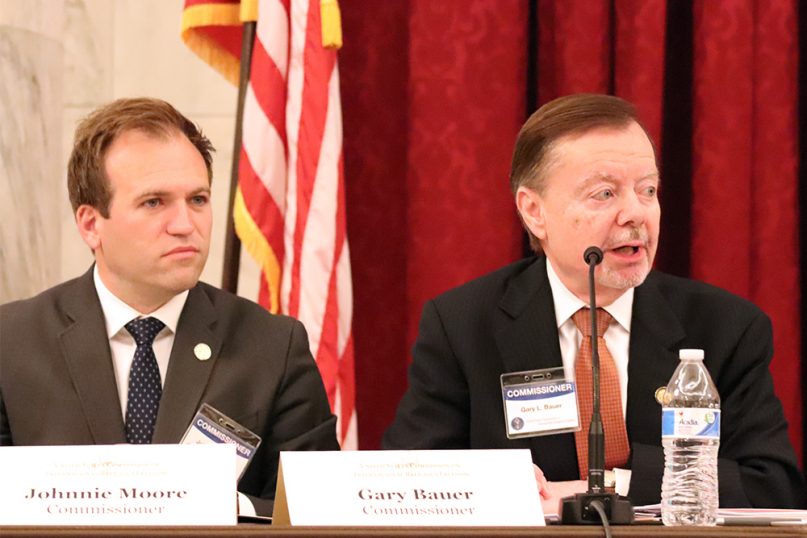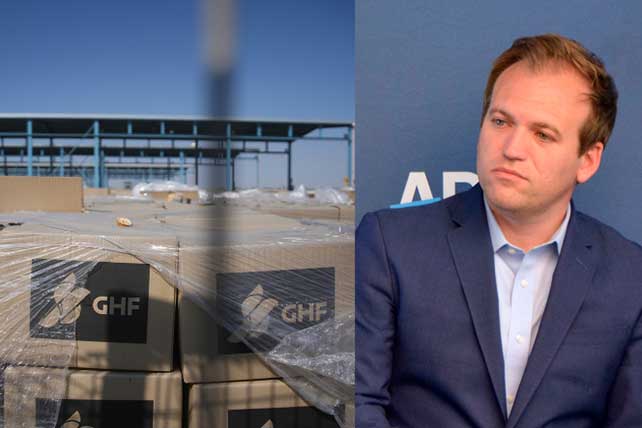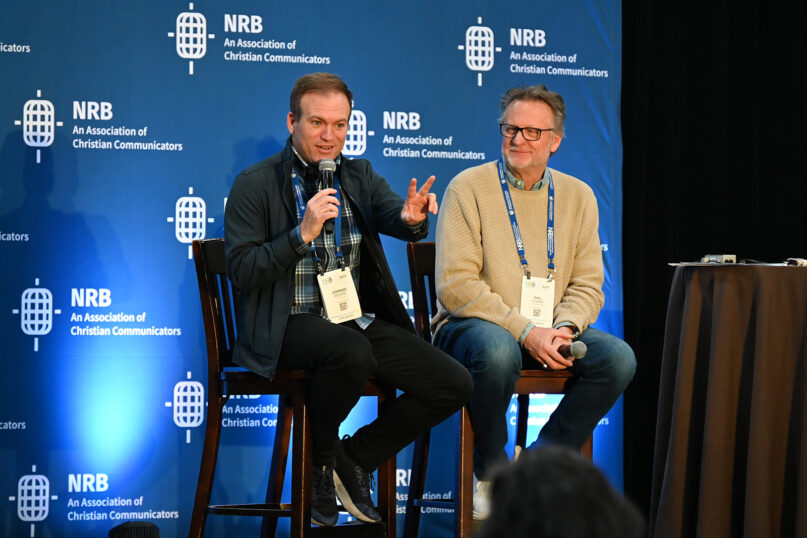His support for Israel is another core commitment and a deeply held spiritual belief. “As Christians, one of our obligations is to love Israel and to love the Jewish people,” Moore told the Jerusalem Post in July, adding that he wants Christians to “do their college degree in Israel. I want Christians to vacation in Israel. I want Christians to spend a portion of their life in Israel.”
Moore is one of several conservative evangelicals who call themselves Christian Zionists and have played powerful roles in Trump’s administrations. They include current U.S. Ambassador to Israel Mike Huckabee, who like Moore has Baptist roots and served earlier in his life as a pastor. The two share an embrace of Israel as the land that God promised to the Jews in the Bible.
Author and ethicist Brandon Ambrosino, who befriended Moore as a Liberty student, said Moore’s leap from PR guru to humanitarian aid honcho showed the influence of “Doc Falwell,” as Liberty’s founder was referred to by students. “Like Jerry Falwell, Johnnie’s very charismatic,” said Ambrosino. “He thinks God has important plans for American politics, and he happens to believe that God is using him to get his plans carried out.”
In a talk in February to religious broadcasters, before joining GHF, Moore spoke about the power of pure charm in winning over critics and achieving results. “I have some really, really great friends that are totally different from me. Their politics are all different from me,” he said. “Now when people say, ‘Do you know Johnnie?’ they’ll say, ‘I disagree with everything that crazy evangelical believes, but he’s a nice guy.’”
Johnnie Moore, left, speaks on a panel alongside Phil Cooke at the National Religious Broadcasters conference, Feb. 26, 2025, in Grapevine, Texas. (RNS photo/Jack Jenkins)
The Rev. Fred Davie, senior executive vice president at Union Theological Seminary, who served with Moore on the USCIRF, said he and Moore got along well despite divergent views on how to deal with religious oppression of LGBTQ people around the globe. “Johnnie’s got a good heart and a good soul and a good mind,” said Davie. “I just think he may be in the midst of things where there are forces that are so much out of his control.”
In his 2011 book, “Honestly: Really Living What We Say We Believe,” Moore details the struggles of his childhood, largely caused by his parents’ troubled marriage. But he makes clear that faith was one way the family presented a good face to the world. “Our Christianity was actually one big PR stunt that we had carefully crafted in order to look good,” Moore wrote.
At 16, Moore wrote, he was living in a basement apartment in Lynchburg, Virginia, with his mother and sister when someone sent the elder Falwell a tape of Moore preaching at a Georgia church. Soon after, an anonymous donor funded a scholarship for Moore to attend Falwell’s Lynchburg Christian Academy for his final year of high school. He went on to attend Liberty, and even before graduating in 2001, had joined the university’s staff, working in the chaplain’s office. “I owe Dr. Falwell so much,” Moore told RNS.
Along with speaking at chapel services, he oversaw the school’s Center for Global Engagement missions, which sent students all over the world on mission trips. In 2014, having become one of the youngest vice presidents at any university in the country, as well as the university’s spokesman, he left, spending less than two years as “vice president of faith content” at Burnett’s One Two Three media before starting Kairos.
In his PR work, he has often been called to defend troubled pastors and organizations such as Gospel for Asia, a missionary group whose founder, K.P. Yohannan, had spoken at Liberty when Moore was chaplain there. After it was sued by donors for allegedly mismanaging millions in donations, the group eventually agreed to pay back $37 million in a settlement.

FILE – U.S. Commission on International Religious Freedom commissioners Johnnie Moore, left, and Gary Bauer speak about the 2019 annual report during a news conference on April 29, 2019, in Washington. (RNS photo/Adelle M. Banks)
Moore was embarrassed after audiotapes of his conversations with troubled megachurch pastor James MacDonald were leaked by a Chicago radio host, a former church member who had clashed with MacDonald. In that recording, MacDonald, who was eventually fired from his church for misconduct, joked about planting child porn on the computer of the publisher of Christianity Today or falsely accusing staff of having affairs after the magazine published stories critical of MacDonald. Moore can be heard laughing along in the background before trying to talk MacDonald down.
“Like all communications professionals, you make some mistakes and there are clients who you would have handled differently in hindsight,” Moore said in a recent email to RNS. “I also believe that in the same way everyone is entitled to a legal defense that people should be entitled to reputational defense.” But he defended his work for Gospel for Asia, saying the legal case against the group was “one of the most gross injustices I’ve ever witnessed.”
In his years heading Kairos, which was bought by JDA Worldwide in 2022, he became known as a crisis communications expert. At a panel in February at the National Religious Broadcasters convention, he explained strategies for responding to situations ranging from a child being injured on church grounds to allegations of sexual abuse. He encouraged listeners to “be fast” when combating narratives and ignore online criticism from lesser-known sources.
“We advise in the digital age that any organization should be telling their story and retelling their story on an ongoing basis,” he said. “Because what ends up happening is, if you haven’t clearly defined who you are, what you do, what your mission is, in the public domain already, when an accusation or an issue happens in the organization, whether it’s a scandal or whether it isn’t, it garners like 10 times the publicity.”
Moore, who stepped down as JDA’s president earlier this year, appears to have brought these same strategies to bear in defending GHF. He has repeatedly framed GHF as an impactful, highly accomplished organization, claiming the group has delivered more than 125 million meals while keeping aid out of the hands of Hamas, something he alleged that other aid groups, such as the United Nations, have been unable to do.
He has appeared on Sunday morning television programs, penned Wall Street Journal editorials and held meetings with Jewish groups and D.C. think tanks, pushing back at critics who claim the GHF lacks the expertise to operate a large-scale feeding operation. Its staff, he told RNS, has been drawn from other major aid organizations and has worked in more than 30 countries. GHF’s executive director, John Acree, Moore said, “has three decades of humanitarian experience, including with USAID, and has dedicated his professional life to this field.”
But his efforts have done little to blunt the criticism from the humanitarian aid sector. In June, 15 international human rights and legal organizations sent a letter to GHF urging the organization to cease operations or face the “risk of criminal and civil liability” for “aiding and abetting or otherwise being complicit in crimes under international law, including war crimes, crimes against humanity, or genocide.”
Religious aid groups have also continued to express deep skepticism of GHF’s methods. In July, religious organizations were among the 110 humanitarian and human rights groups to sign a letter calling for a new effort led by the U.N. Signers included the American Friends Service Committee, Episcopal Peace Fellowship, Islamic Relief, Mennonite Central Committee and Churches for Middle East Peace. (Samaritan’s Purse, the disaster relief humanitarian group founded by Trump ally the Rev. Franklin Graham, is one exception, having collaborated with GHF to provide aid.)
More recently, leaders of the largest Jewish denomination in the U.S., the Union for Reform Judaism, published a lengthy statement lamenting starvation faced by Gazans and, URJ spokespeople confirmed, implicitly criticizing GHF’s actions.
Muslims have been unsparing in their criticism as well. “American Muslims are deeply disturbed by how this whole process of establishing the GHF and completely sidelining all other humanitarian organizations has played out,” said Haris Tarin, vice president of policy and programming for Muslim Public Affairs Council. “We believe it is a deliberate act by the Israeli government, with its Christian nationalist allies in the Trump administration, to choke off any real aid into the strip, which would then lead to the mass displacement of the Palestinian people.”
Most damningly, Anthony Aguilar, a former U.S. Special Forces officer who worked with one of the contractors that secured GHF aid sites in Gaza, said in July that he had personally witnessed Israeli soldiers and American contractors open fire on unarmed Palestinians near GHF sites. In an interview with the BBC, he described incidents of Israeli forces firing on crowds of hungry people and tanks blasting their main guns into the crowd.

Palestinians carry humanitarian aid packages near a Gaza Humanitarian Foundation distribution center operated by the U.S.-backed organization in Khan Younis, southern Gaza Strip, June 26, 2025. (AP Photo/Abdel Kareem Hana)
“In my entire career, (I have) never witnessed the level of brutality and use of indiscriminate and unnecessary force against a civilian population — an unarmed, starving population,” Aguilar told the BBC. “I witnessed war crimes.” He provided video of what he said were American GHF security guards opening fire, with one person being heard shouting, “I think you hit one!”
Aguilar’s account echoed an investigation by the Israeli newspaper Haaretz that quoted anonymous Israeli soldiers who said they were ordered to shoot at unarmed Gazans seeking aid, even when no threat was present.


